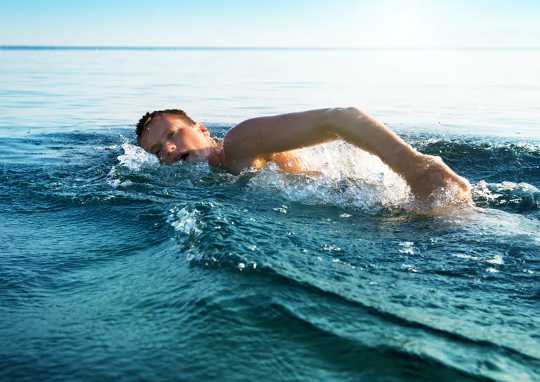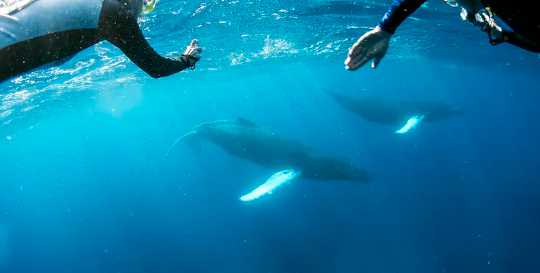 Iakov Kalinin/Shutterstock
Iakov Kalinin/Shutterstock
Summer is the season when we like to cool off with a plunge into water. For some it’s in the local or backyard swimming pool, but others prefer the salt water of the ocean.
Sometimes referred to as “wild swimming”, it is happening at many of the beaches, coves, bays or estuaries in Australia.
But wild swimming is not only good for our health, it can also be good for ocean and beach ecologies too.
A healthy ocean plunge
Annual competitive ocean swims, such as the Byron Bay Winter Whales and the Bondi to Bronte, are a mainstay of many Australian coastal towns and city suburbs. Daily and weekly recreational swimming groups are also well established at many of our beaches.
Get The Latest By Email
In European cultures, immersion in salt water has long been believed to be good for human health and seaside resorts there remain popular.
Ocean swimmers often wax lyrical about the health and wellbeing benefits they get from their regular ocean swims. And research from both the humanities and sciences backs up these claims.
It’s common to hear swimmers describe their troubles and anxieties washing away in the water. Like a daily cleansing, they emerge from their swim feeling energised, calm and ready to face their days.
Journalist and broadcaster Julia Baird has written about how her daily swims in Sydney inspire a sense of awe that shifts how she navigates other challenges in her life.
Other research talks about swimming as a process of “therapeutic accretion” whereby the pleasures of our regular short dips and longer swims in the ocean layer onto us and “build to develop a resilient wellbeing”.
In the UK, online movements such as #risefierce and Mental Health Swims promote regular swimming as a positive practice for our health and wellbeing.
Part of this is accepting that ocean conditions can change day to day. Some days are calm and clear, others are wild with waves and winds. If we want to swim, we have to learn to navigate the conditions we are dealt.
This capacity for decision-making in the face of challenge is helpful for a sense of confidence and resilience – something that has been clear during COVID-19 lockdowns around the world.
Encounters with the wild
For swimmers, the water offers other rewards.
Swimming, like other ocean sports like surfing and diving, is a way of immersing us in ecologies and bringing us into contact with animals, plants, weather, waves and rocks in a way that we cannot control.
We may encounter fish, birds, rays, turtles, cephalopods and other animals. All are reported to help with a sense of wellbeing. This highlights how we are part of these ecologies too.
The recent film My Octopus Teacher resonated with many people who swim and who regularly encounter the same animals.
Some swimmers even relate the effect of swimming to animals that live in oceans. In a study on swimming in the UK, one swimmer explained how they “went in like a cranky sea lion and came out like a smiling dolphin”.
Care for the oceans
Being part of an ecology means we have responsibilities too. In Australia, we need to take a lead from Indigenous Australian people to care for the sea country we swim in.
Ocean plastics, sewage and the antibiotics in agricultural run-off are a potential problem for our health as we swim in polluted oceans.
Our encounters with animals that live close to shore can impact their health too, so we need to remember to respect their space.
 We need to be careful in our encounters with wild animals as we swim in ocean waters. Christopher Michel/Flickr, CC BY
We need to be careful in our encounters with wild animals as we swim in ocean waters. Christopher Michel/Flickr, CC BY
Many cultures are aware of the interconnections between people and the environments they live in. For example, Native Hawaiian and Māori researchers write about their links to oceans, and the Ama women in Japan connect with underwater soundscapes as they dive for abalone.
In Australia, Aboriginal and Torres Strait Islander people are deeply aware of the connections between the health of people and the land, sea and sky countries they live on.
People cannot be healthy if Country is not healthy, nor can Country be healthy if people are not.
And that’s why wild swimming could be good for ocean and beach ecologies too. The more we learn about the health and wellbeing impacts of ocean and coastal ecologies, the more we should feel invested in taking care of them.
Let’s swim together
The lack of control we have over conditions in ocean waters can be frightening, and the same encounters that thrill some people are terrifying for others.
Even for experienced swimmers, drowning is a very real risk. Between July 2019 and June 2020, 248 people drowned in Australia, with 125 of those coastal drowning deaths.
For others their fear of shark attacks and encounters is enough to keep them out of ocean water.
So if you want to give the ocean a try this summer, many people find comfort and safety by wild swimming with others. This is reflected in the growth of swimming groups.
Websites such as oceanswims.com and Swim Sisters list ocean swimming groups and competition swims around Australia. It’s easy to find information through your local community too.
Swimming in the sea can be as simple as taking that first plunge in knee-deep water, or as challenging as an hours-long marathon along the coast. Whatever you prefer, take the time to enjoy being immersed in a watery world.
You’re never too old (and it’s never too cold).
About The Author
Rebecca Olive, ARC DECRA Fellow, The University of Queensland
This article is republished from The Conversation under a Creative Commons license. Read the original article.
books_health







